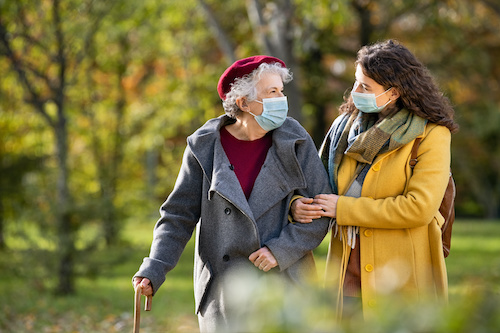
New Brunswick, N.J., October 26, 2021 – Caregivers are individuals who provide emotional and physical care for a person with cancer. Being a caregiver to a person with cancer can present some unique challenges. Caregivers may have to learn about the diagnosis or treatment for the person they’re caring for, give them medication, go with them to appointments and communicate with their cancer care team. In addition to caring for someone with physical and emotional needs related to cancer, caregivers are likely balancing this responsibility with their own obligations such as family and work.
Arlene D. Cruz, RN, BSN, OCN, nurse clinician at Rutgers Cancer Institute of New Jersey, helps to examine the issues facing caregivers of patients with cancer and shares how oncology nurses and family caregivers can work together and support each other throughout the cancer journey.
What are the most common challenges faced by caregivers for cancer patients?
The challenges can be categorized as practical and emotional. From a practical stand point, caregivers step up to coordinate the day to day nuances of appointments, rides and chores, all the while adjusting their schedules and household needs to fit the needs of their loved ones. Emotionally speaking, as a caregiver, you are in the unique position to support someone you love going through a difficult time in their lives yet at the same time, you are charged with safeguarding your loved one’s autonomy (independence) while advocating for their needs.
In a very real way, patients need someone to support or even take care of the minutia of their day-to-day lives and in some cases help make decisions about their care. You want to be supportive of someone you love. However, it takes immense courage and strength to do this while not letting your emotions, beliefs, and biases get in the way of your loved one voicing their wishes. This balancing act can sometimes be the most challenging aspect of being a caregiver, especially when decisions about end of life are discussed.
What are some tips to help patients and their caregivers better communicate with nurses and healthcare teams?
Learn your system! On the first visit to a new healthcare team— especially large institutions, ask about what the process is to get in contact with your team. Is there a particular contact person you should ask for? The advancement of technology has broadened our way to communicate in various ways. Ask if there is an email that you can reach your team at. Ask questions like: what is the process for reaching your team after business hours? What is the expectation on response time? Make sure that when you leave a message, you leave a full name, date of birth and good contact phone number that you can be reached at. Rutgers Cancer Institute of New Jersey and RWJBarnabas Health also has a robust oncology nurse navigation program. These medical professionals have training and expertise in guiding patients and their caregivers with making informed decisions and provide increased supportive care throughout their cancer journey.
What strategies can help caregivers deal with their loved one’s cancer experience?
The moment someone is diagnosed with cancer, they feel there is a death sentence hovering over their head, and at that time they begin to grieve. You need to understand that not only is your loved one grieving, you are too. Let yourself grieve. Cry if you need to. If you don’t want to cry in front of your loved one, then go outside and take a walk. Be kind to yourself. Forgive yourself if you are having a bad day or had a bad reaction- each day is a new day to try again. Take time to process what you are feeling and why. Make sure that you are taking care of yourself physically, emotionally and spiritually. An empty cup can’t pour out- you cannot “pour out” caring love and empathy for your loved one if you do not first “fill” yourself up with self-love, mercy and understanding. Taking the time to process what you're going through and what you're feeling will help you know when to ask for help. If you don't know who to ask for help, ask your nursing staff. We will try our best to help get you the support you need to deal with your experience with cancer.
Are you a caregiver looking for support? Rutgers Cancer Institute of New Jersey, the state’s only National Cancer Institute-designated Comprehensive Cancer Center together with RWJBarnabas Health, offers support services for cancer patients as well as caregivers. Learn about our Patient Support Services program. For additional resources, visit our Caregiving Resource Center.

